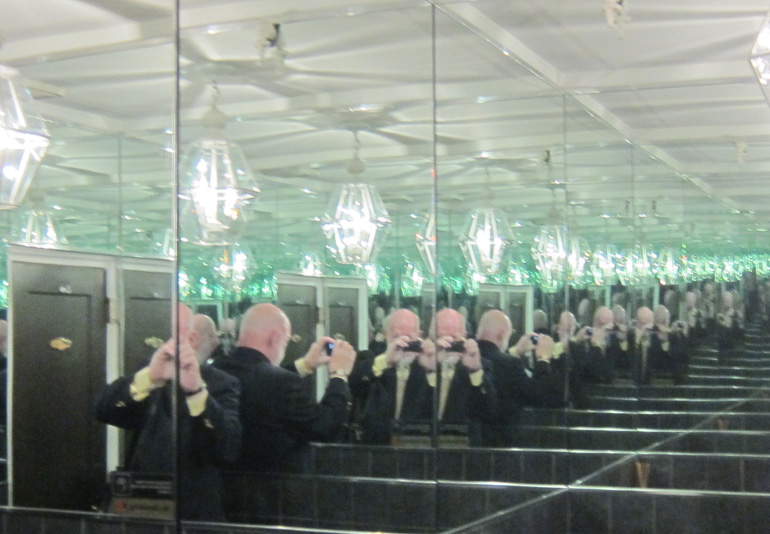Gotham Diary:
Hitch
26 June 2013
It appears that I’ve come late to the technique of aiming a camera without putting it in front of my face. What keeps this picture from being simply foolish is the irregular band of greenish light, which seems supernatural because it isn’t really there, if you know what I mean. This photograph is also a change from the brutalist pictures of the subway-station mess outside my door. Our driveway has been shut down for eight weeks, four weeks to undermine and replace each of the drive’s crossings of the sidewalk. It gets harder every day to believe that one will outlive the chaos.
This morning, I finished Stephen Rebello’s Alfred Hitchcock and the Making of Psycho. I bought the Kindle edition after watching the lovely picture that Sasha Gervasi loosely adapted from it. Reading about Hitchcock has developed something of a déja vu problem: I’m more aware of revisiting (very) familiar territory that I am of learning new things. I suppose I owe that to Donald Spoto. It has been nearly thirty years since I took his Hitchcock course at the New School, a thrilling experience that ranked with the very best classroom experiences. The lectures were followed by screenings, which could be attended separately, as it were. Kathleen signed up for the screenings only, so we would watch the movies together, but I would be exploding with observation. I hesitate to call Spoto’s lectures “academic,” not because they were somehow less than that but because they were so passionately devoted to simple attentiveness. I learned a lot more than Hitchcock — I learned to watch movies. Hitchcock, of course, rewards attentiveness more than most directors do; he was a formidably intentional artist. I’m about due for a serious retrospective — or should I say that Hitchcock is, chez moi — and Psycho, which I held off watching while reading Rebello’s book, would be a great way to open it. It’s not a favorite movie of mine, probably because it is stamped by the aesthetic of television that makes so many of the Alfred Hitchcock Presents episodes look cheap and depressing. (In contrast, I don’t in the least mind the pronounced staginess of Rope or Dial M for Murder.) And, as Hitchcock’s films go, Psycho is uncommonly gruesome. If we must have psychotic mayhem, let it be the more suave brutality of Barry Foster, in Frenzy. (Plus, of course, Frenzy has all those lovely bits in which Vivien Merchant serves up exotic French dishes to Alec McCowen, who finds them repulsive.) But, as Rebello reminds me, Marion Crane’s ordeal is extraordinarily dramatic.
Rope, I always say, is the perfect party movie — never has there been a more intriguing party in the movies. Yes, it’s perfectly horrible that poor David Kentley has been murdered and tossed into the chest, upon which dinner is served — ghoulish! But one man’s ghoulish is another man’s goulash. As party stunts go, this one can’t be excelled; it is a true ne plus ultra. It doesn’t stop there, however, David’s body quite literally embodies all the domestic realities that must be swept aside in order for a party to sparkle. It’s the sweeping aside that makes a party sparkle. Finally, it’s startling to imagine that one might have been to a party where dead body lay just out of sight, and never known it.
***
Hostile as I am to the pro-corporation bent of the current Supreme Court, I cannot say that Shelby County v Holder, the voting rights case, bothers me very much. The gerrymandering of congressional districts, apparently unhampered by any preclearance rules, has created divisive feedback loops that give us a fun-house mirror version of representative democracy. The Voting Rights Act, as passed nearly fifty years ago, was necessary at the time, but instead of being replaced by something more suited to changing times, its provisions were tinkered with. That’s why American regulation doesn’t work. The fact that most of our securities laws still radiate from a template established in 1933 and ’34 shows an astonishing want of imagination. And if the Glass-Steagall act was seen to be somewhat outdated, then it ought to have been replaced with a law that retained its essential safeguards, which of course turned out to involve proprietary trading with customer money.
To say that just about every law in the land ought to be replaced sounds cranky, but it wouldn’t, if we could only learn to replace our “build to last” mentality with a more supple “build to upgrade” outlook. Things that last tend toward sclerosis: pipes get clogged, and regulations get unworkable. Bridges fall down. The most powerful committee in every legislative chamber ought to be the one that decides which old laws must be updated, and it ought to be staffed by men and women who know how to cloak the inexorable impermanence of things with the appearance of stability. We also need to develop a better model of the regulatory agency. Requiring heads of agencies to have degrees in civil administration would be a great start.
I might not be so complacent about the voting rights decision if it weren’t for US v Windsor and Hollingsworth v Perry.

